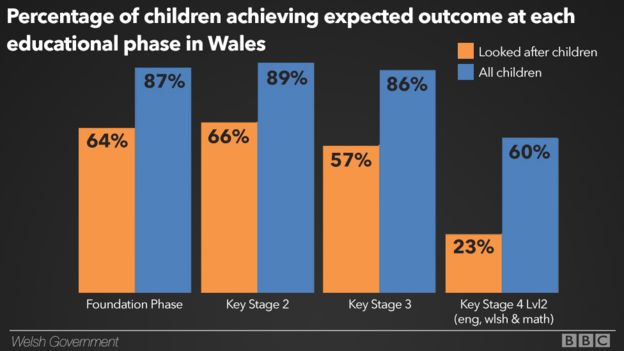
CREDIT: This story was first seen in BBC News
Increased access to therapeutic support for looked-after children is needed in Wales to improve their chances in school, a charity has said.
BBC News reports that figures show children in care in Wales performed less well in school at every stage in 2015-16.
Danielle Cope, from Action for Children Wales, said it was currently a “post code lottery” what help they received.
The Welsh government said it was spending £4m a year implementing its plan to support looked-after children.
There were 3,648 children of school age being cared for by local authorities in Wales as of March 31 2016.
The figures, from the Wales Children in Need Census 2016, show the biggest gap in achievement was at Key Stage 4 – when pupils study GCSEs – with 23% of looked-after children achieving expected outcomes compared with 60% of all children.
While this was an improvement on the previous year, there was still a large gap.
Ms Cope said many children in care had experienced significant adverse childhood experiences by the time they reached their school years.
“The long-term stability of a loving family is often replaced by traumatic experiences like abuse, neglect, loss, separation and a disrupted education,” she said.
“Sadly, these figures reflect a mere snapshot of the impact that this early trauma can have.
“With low school attendance, poor educational outcomes and an inconsistent home life, it’s likely these children will move into their adult years without the skills they need to regulate their emotions and cope with the pressures of adult life.”

Ms Cope said it was “crucial” more was done to tackle the impact of this trauma during their school years, adding: “The Welsh government should increase access to therapeutic support.”
This support, she said, should involve a trained professional addressing their mental health and emotional needs.
Ms Cope said she would like to see services like MIST, in Torfaen, rolled out across the country.
“It’s a postcode lottery of different services provided by different authorities across Wales,” she said.
“By equipping them with the mental and emotional skills they need, we can help looked-after children to build their capacity to deal with the trauma of their past and increase their resilience in the face of future adversity.
“If the consistent care offered by their foster carers is reflected in a nurturing school environment, we can improve the way we work together to alter the life chances of looked-after children for the better.”
Prof Sally Holland, the Children’s Commissioner for Wales, said she had met with every local authority in Wales over the last year, “to discuss how they plan to increase the support available to the young people in their care and I’ll be keeping close contact with them to see that the right support is provided”.
Prof Holland said she also continued to meet regularly with children in care to hear about their experiences, and was monitoring government action on this through the Ministerial Advisory Group on improving outcomes for looked-after children.
“When they are accommodated in local authority care everyone should be aiming to help them overcome those early experiences and fulfil their potential,” she said.
“We can’t expect children to succeed academically if they’re worried about other things like a lack of emotional support, guidance, or where they’re going to live.
“Children need stability, the right support, and positive relationships with the adults around them in order to succeed.”
A spokesman for the Welsh government said: “We are working to ensure that all children, whatever their background, have equal opportunity to reach their full potential.
“Looked-after children must have the same opportunities as their peers.
“Over recent years we have seen excellent improvement in the GCSE results of those in care, but we recognise that there is still much more to do.
“Last year, we published the Welsh government’s strategy to support pupils who are looked after.
“This plan is underpinned by some £4m annually through the Pupil Development Grant and reflects the intrinsic relationship between the social context of the child and their educational attainment.”
Don’t forget to follow us on Twitter, like us on Facebook, or connect with us on LinkedIn!

Be the first to comment